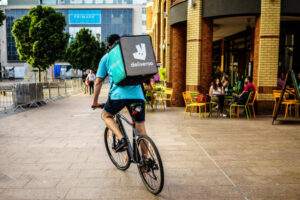3 Strategies making use of Online Delivery Platforms
Virtual brand
Virtual brand is a brand without physical stores. For food service companies that already have their physical stores, opening up a virtual sub-brand would be a way of making full use of the companies’ kitchens. Sub-brands allow companies to connect with their potential customers without taking a risk to their main brands and also without being restricted by their main brands.
Opening up a sub-brand is not a new strategy as it has been used to broaden the customer base that could not be reached by main brands in terms of prices and food styles. For example, “UFUFU Café(うふふカフェ)”, which was established in Japan’s Saga prefecture, entered Hong Kong in 2016, is using “L.D.K. by Ufufu Cafe” as their main brand and opening up “Omelette Rice by Ufufu Café” and “Japanese Burger & Steak by Ufufu Café” as their sub-brands.
However, sub-brands which occupy physical stores would be costly on rent and food. Virtual brands using online platforms would be a more low-cost, low-risk choice, which also can open up new customer bases and allow new challenges for the companies. For customers, they would also be enjoying different choices and new menus.
According to Deliveroo’s data, 84% of customers who ordered from virtual brands had not ordered from the main brands before. Moreover, 42% of the virtual brands are having higher ratings than their main brands, which could develop new customer bases and possibilities for the companies.
Shared kitchen
A Shared kitchen is also known as cloud kitchen, which is a facility mainly used to prepare dishes for food delivery. There are usually several restaurant owners and chefs sharing one rental space, and only provide delivery food service.
Customers can order a variety of dishes from more than one brand using the same delivery order, which makes a better food delivery service experience. For restaurants, businesses can be started and expanded using only low cost investments. The economized capital can be used for further expansion. New kitchen set-up issues, such as construction and FEHD license applications, and kitchen management could be easily done by using a shared kitchen as a solution.
Analyzing data from online platforms
Food service companies usually only have their own sales data, which makes analyzing market trends involving other companies’ business conditions difficult. Although there might be differences between online platforms’ services, we would take Deliveroo’s data analyzing service as an example:
By using Deliveroo’s global database analysis, restaurant partners could review their own sales data as well as data of surrounding areas. For example, the most popular dishes, kinds of cuisines undergoing rapid sales growth and shortage in supply, average sales amount, trend and frequency of orders.
The data analyzing service “Marketer” provided by Deliveroo, can target customers accurately and offer special promotions at a suitable timing.
Conventionally, even if restaurants announce promotions on their social media pages, there are no ways to distinguish whether a customer is a new or current existing customer. By using Marketer, restaurant partners could make more efficient use of their marketing budget focusing on reaching potential customers only. According to Deliveroo’s data, if new customers discover a restaurant through Marketer’s offer, the possibility for them to become the restaurant’s repeater is almost same to customers who discover the restaurant by themselves in other ways.
“Food delivery” is not only “meals”
As there are plenty of supermarkets and wet markets within walking distance from residential areas, online purchasing of groceries, especially fresh food, was not popular in Hong Kong. However, delivery is becoming more popular as people refrain from going out due to COVID pandemic. Consumer ecosystem of one-stop-shop is now expanding.
For example, Deliveroo which equipped with the most trusted grocery brands in Hong Kong, such as PARKnSHOP, 7-Eleven and DON DON DONKI, achieved growth of registered shops by 210%, 240% repeaters growth, and new customer monthly growth by 118%.
Food service companies could make use of online platforms to further expand their customer base, by also selling groceries such as condiments, paper pack drinks and bottle drinks.
MAY Planning provides support on business expansion to Hong Kong and promotions towards Hong Kong’s market. Support on implementing delivery service platforms is also available. Feel free to contact us anytime.
]]>

